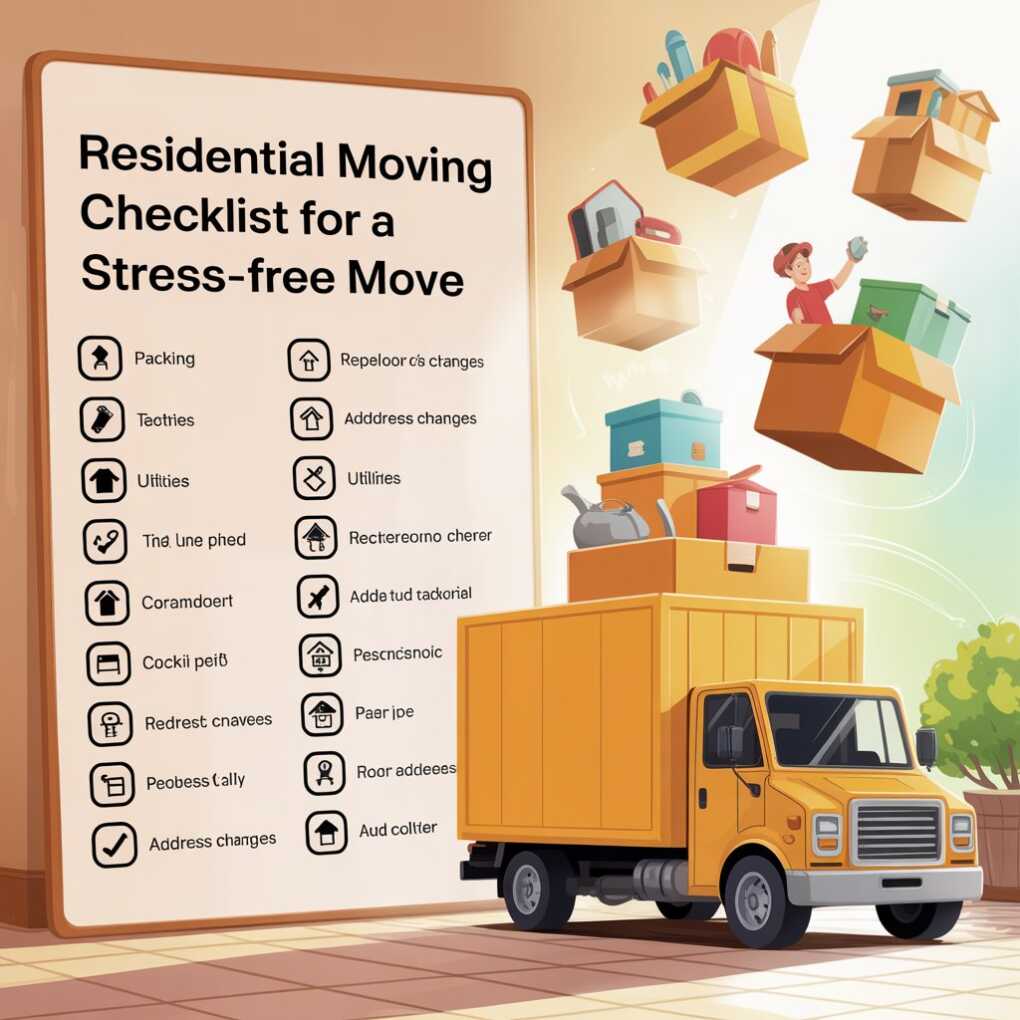Moving to a new home can be both exciting and overwhelming. The process involves many tasks that require careful planning and organization to avoid last-minute chaos. Having a clear roadmap can make a significant difference in reducing stress and ensuring everything goes smoothly. We will explore a comprehensive checklist to guide you through every important step of your residential move. By breaking down the tasks into manageable actions, this guide helps you stay on top of things and keep your move as seamless as possible. Whether moving across town or to a new city, following this checklist can transform your moving experience into a more manageable and enjoyable journey.

Essential Steps to Prepare for a Smooth Residential Move
Plan Your Timeline and Budget
Start by setting a realistic residential moving date and creating a timeline that outlines when each task should be completed. This helps you avoid rushing through important steps at the last minute. Establishing a budget early on is equally important, as moving costs can quickly add up. Include expenses such as hiring movers, renting a truck, packing materials, utility deposits, and cleaning services. Planning ahead will give you a clear sense of what to expect financially and allow you to adjust to keep costs under control.
Organize and Declutter Your Belongings
Moving presents a perfect opportunity to sort through your possessions and decide what to keep, donate, or discard. Decluttering reduces the volume of items you need to pack and transport and helps create a fresh start in your new home. Take your time to go through closets, cabinets, and storage areas. Be honest about what you use or want to bring with you. Items in good condition can be donated or sold, which can even help offset some moving expenses. Remember, the fewer things you move, the simpler the process becomes.
Gather Packing Supplies and Start Packing Early
Once you know what you will take with you, collect all necessary packing materials such as boxes, tape, bubble wrap, and markers. Packing well before your move date reduces stress and prevents last-minute scrambling. Begin with items you use less frequently, like seasonal clothing or decorative pieces. Label each box clearly with its contents and the room it belongs to in your new home. This will make unpacking easier and faster. Keeping an inventory list of packed boxes can also help you keep track of your belongings throughout the move.
Notify Important Parties of Your Address Change
Informing relevant organizations and individuals about your move is crucial to avoid disruptions. Notify your utility providers to schedule disconnections and new connections at your new address. Update your mailing address with the post office, banks, insurance companies, and any subscriptions you receive. Don’t forget to inform your employer, school, and healthcare providers. Making a checklist of all the places that need your updated address will help ensure nothing gets overlooked during this busy time.
Arrange for Moving Assistance
Decide whether you will hire professional movers or handle the move yourself with the help of friends and family. If hiring movers, research and book a reliable moving company well in advance to secure your preferred date. Confirm all details, including insurance coverage and pricing, to avoid surprises. If moving alone, reserve a moving truck early and enlist volunteers to assist with heavy lifting and loading. Having enough hands on deck makes the process safer and more efficient, reducing physical strain and time spent on the move.
Prepare Your New Home
Before moving in, visit your new residence to ensure it is clean and ready for occupancy. Arrange for any necessary repairs or maintenance in advance. Consider setting up utilities and internet service to be active when you arrive. Plan furniture placement ahead of time to make moving day less hectic. Clearing pathways and creating a welcoming environment will help you settle in more comfortably and quickly. Taking these steps before your belongings arrive can make the transition feel smoother.
Pack an Essentials Box
When arriving at your new home, prepare a box or suitcase with the essential items you need immediately. Include toiletries, a change of clothes, important documents, basic kitchen supplies, chargers, and any medications. This ensures easy access to necessary items without having to unpack everything immediately. Having a go-to box will save time and reduce frustration during those first few hours after moving in, when you may be tired and eager to settle.
Take Care of Final Details Before Moving Day
Confirm all arrangements with movers or helpers in the days leading up to your move. Double-check that utilities are scheduled to be turned off at your old home and activated at your new one. Clean your residence or hire a cleaning service, especially when renting or selling the property. Ensure all important documents, keys, and valuables are packed separately and securely. These final preparations will help you leave your old home in good condition and arrive at your new home ready to begin the next chapter.
Conclusion
Moving does not have to be overwhelming when approached with thoughtful planning and clear organization. By following a detailed checklist, you can manage the process step-by-step, keeping stress levels in check. Planning your timeline, decluttering, packing strategically, and communicating necessary changes will set you up for a smooth transition. Preparing your new home and keeping essential items accessible will make your first days more comfortable and less chaotic. Ultimately, a well-organized move lets you focus on the excitement of starting fresh in a new space, turning a potentially stressful event into a positive experience.
